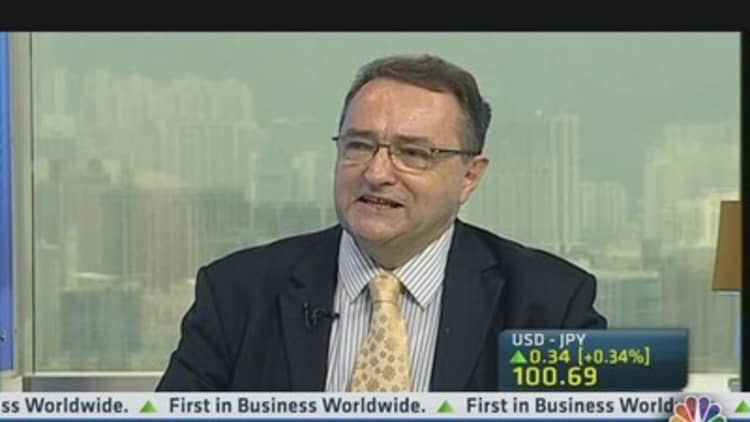Japan's benchmark Nikkei stock index fell to its lowest level in almost six weeks on Monday, raising the specter of a second month of volatility for the world's major equity markets.
Still, strategists say a degree of calm should return to markets in the U.S., Europe and Asia since a reassessment of expectations for Federal Reserve monetary policy has largely taken place.
"I don't think we're going to have the same kind of downside that we saw in May," said Chris Weston, chief market strategist at trading firm IG. "We're not having a move in the Fed Funds [interest rate], we're having a move in the pace of asset purchases and there's a major difference between the two."
"We've gone through an adjustment process where people have been very concerned about life without stimulus. We're going to slowly live with that, what we saw in May was a shock to the system," he said.
(Read More: Here's How the Party Will End If the Fed Pulls Back)
Worries that the U.S. Federal Reserve could start taking back its massive monetary stimulus sooner rather than later was a key reason for a heavy sell-off in stocks last month. U.S. stocks ended May with heavy losses and Japan stocks suffered their two sharpest one-day sell-offs so far this year.
"There is so much liquidity that a slight tapering, say switching to purchases of $60 billion from $85 billion is not going to make a big difference to excess liquidity," Geoff Lewis, global market strategist at JP Morgan Asset Management told CNBC Asia's "Cash Flow." "I don't think markets need to worry about a withdrawal of liquidity — that's not going to pull the rug out from under risk assets."
The Fed is currently buying $85 billion worth of U.S. Treasury and mortgage-backed bonds every month and its asset-buying has helped keep interest rates low, helping the economy recover.
(Read More: Europe Markets That May Be Worth Snapping Up)
Pull-Back Not Slump?
According to ING Financial Markets Research, equity markets in the developed world have rallied every month so far this year, except in May when they shed 0.3 percent.
And June did not get off to a good start as data from China showing factory activity shrank for the first time in seven months in May undermined regional equity markets.

The Nikkei, arguably the most volatile major market last month, could see some further near-term weakness but was unlikely to be hit by the hard, sharp sell-offs that characterized May, analysts said.
"Japan is somewhere you want to be on a medium term basis. Given how much the market has moved there could still be some near-term weakness but we are looking for opportunities and we would be looking to add to Japan," said Clay Carter, head of international equities at Perennial Investment Partners.
The is down more than 15 percent from a 5-1/2 year set last month but is still up about 33 percent in terms of its year-to-date gains.
Japan remains the best performing major equity market globally, bolstered by a weak yen and brighter economic prospects. Tokyo is this week expected to outline its long-term growth plan, which could provide a fresh steer for the market.
(Read More: Will It Be Hit or Miss for Shinzo Abe's Final Arrow?)
"We're running into the Upper House [parliamentary] elections in July and clearly Japan is not going to want a fall in the Nikkei heading into that. So I can't get too bearish on the Nikkei at current levels," said IG's Weston.
Japan's Prime Minister Shinzo Abe was reported saying on Monday that he is closely watching market movements, but held back from commenting on them.
— By CNBC.Com's Dhara Ranasinghe; follow her on Twitter @DharaCNBC


